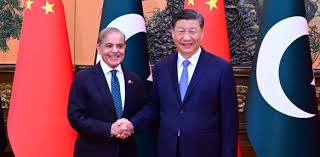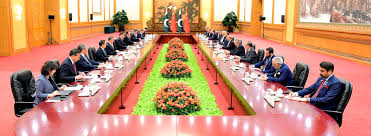Top business body supports Pakistan-China agreement to upgrade CPEC, promote high-quality development

Islamabad: The Businessmen Panel (BMP) of the Federation of Pakistan Chambers of Commerce and Industry (FPCCI) on Sunday afternoon announced its support for the Pakistan-China agreement to upgrade the China-Pakistan Economic Corridor (CPEC) and promote high-quality development in its second phase.
This includes relocating Chinese manufacturing units to Pakistan and demanding equal opportunities for Pakistanis in CPEC projects.

Mian Anjum Nisar, the former president of FPCCI and BMP Chairman, emphasized that the Pakistani government should extend the same facilities to local businesses as those provided to Chinese investors.
He endorsed Prime Minister Shehbaz Sharif and Chinese President Xi Jinping’s commitment to deepening cooperation in various fields, including political, security, economic, trade, and cultural exchanges.
In a statement, Nisar expressed strong support for the Pak-China agreement, which aims to steer CPEC in a new direction for future cooperation, particularly by relocating Chinese manufacturing units to Pakistan. He also highlighted the growing call for local diesel use as concerns about Pakistan Railways’ import dependency rise.

Nisar welcomed the relocation of Chinese industry and the provision of Chinese financing for future projects, viewing these as significant steps towards transforming Pakistan from a low-income to a middle-income country. He urged the government to prioritize projects with high economic impact.
The decisions to expand CPEC were made during Prime Minister Shehbaz Sharif’s meeting with Chinese representatives. The meeting was considered fruitful, setting a new direction for CPEC and promising tangible progress in its second phase.
Nisar stressed the importance of socio-economic and industrial cooperation in the second phase of CPEC.
He underscored the need for bilateral economic cooperation to benefit both countries, with plans to expand CPEC into sectors such as copper, gold, oil, gas, and affordable housing.
The copper and mineral development, in particular, is expected to be mutually beneficial, given China’s status as a major copper importer.
Nisar pointed out that the oil and gas sectors alone could attract up to US $10 billion in Chinese investment. Reviving Pakistan Steel Mills with Chinese assistance could reduce the import bill by US $4 billion.
He also highlighted Pakistan’s security challenges, particularly from its neighboring countries, and the need for comprehensive border fencing with Afghanistan and Iran.
Nisar declared that CPEC would be a gateway to progress and prosperity, with significant milestones anticipated in the coming year.
The reaffirmation of the All-Weather Strategic Cooperative Partnership by the top leaders of both countries was also noted, following a productive meeting between PM Shehbaz Sharif and President Xi Jinping, attended by Chief of the Army Staff General Asim Munir, federal ministers, and senior officials. This was PM Shehbaz Sharif’s first meeting with the Chinese president since taking office in 2024.
The meeting was marked by the traditional warmth reflective of the strong strategic ties between the two nations. PM Shehbaz expressed gratitude to President Xi for the warm reception and praised Xi’s visionary Belt and Road Initiative (BRI) and Global Development Initiative (GDI). He acknowledged CPEC’s significant contribution to Pakistan’s socio-economic development as the flagship project of BRI.
PM Shehbaz Sharif reiterated Pakistan’s commitment to the high-quality development of CPEC and aligning the development strategies of both countries through close coordination. He assured full support for the safety and security of Chinese nationals, projects, and institutions in Pakistan.
During a banquet hosted by President Xi, further discussions on mutual interests took place. Pakistan and China agreed to continue close consultations on regional and global issues, particularly during Pakistan’s two-year tenure as a non-permanent member of the UN Security Council.
The delegation-level talks concluded with the signing of 23 Memorandums of Understanding (MoUs) and agreements, witnessed by PM Shehbaz Sharif and Premier Li Qiang.
These agreements aim to deepen cooperation in various areas including transport infrastructure, industry, energy, agriculture, media, health, water, and socio-economic development.





